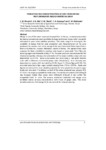| dc.description.abstract | Mango is one of the most important tropical fruit. In Kenya, increased production
has been observed over years paralleled by large postharvest losses which are partly
attributed to poor value addition practices. This study sought to investigate the
suitability of mango fruit for wine production and characterization of the wine
produced. Six mature and unripe mango fruits were harvested three times from a
farm in Katheka Kai Division, Machakos County of Kenya. The ripened fruits were
screened for their suitability to produce wine based on juice yield, °brix (°Bx), pH,
reducing sugars and titratable acidity (TTA). The wine produced was analyzed for the
chemical properties whereas characterization of the major volatile compounds was
determined by GC‐FID. Sensory evaluation was done using a nine point hedonic
scale with a reference commercial grape wine (chardonnay). Juice recovery was
dependent on variety with Kent yielding 72.8%, Apple 71.3% and Ngowe 67.6%. The
extracted juice had a high sugar content ranging from 17.0 to 23.9°Bx. Apple and
Ngowe variety had the most suitable properties for wine production based on sugar
levels and juice yield. The ethanol content of the wines produced was between 8.9‐
9.5 %v/v, the range acceptable for table wine. The methanol content (128‐129mg/l)
was however higher than grape wine (100mg/l) although it was within the
acceptable limits for wine. The sensory evaluation indicated that mango wine
exhibited similar sensory characteristics with those of grape wine. This study
provides evidence that mango fruits are suitable for wine processing. | en_US |

